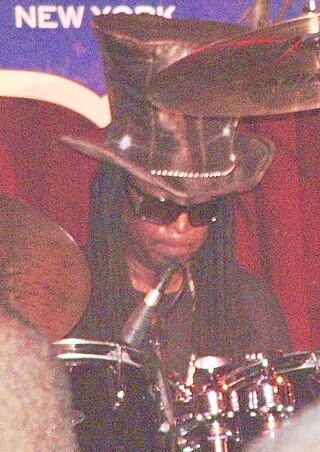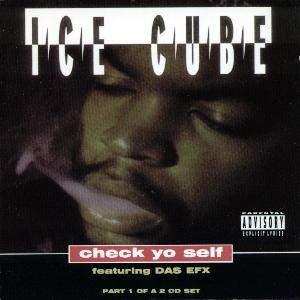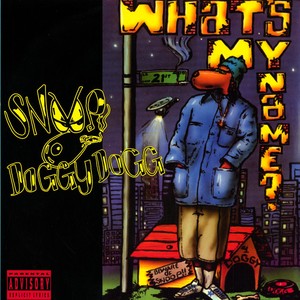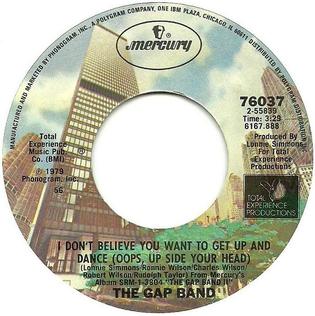
George Edward Clinton is an American singer, songwriter, record producer and bandleader. His Parliament-Funkadelic collective developed an influential and eclectic form of funk music during the 1970s that drew on Afrofuturism, outlandish fashion, psychedelia, and surreal humor. He launched his solo career with the 1982 album Computer Games and would go on to influence 1990s hip-hop and G-funk.

The Chronic is the debut studio album by American record producer and rapper Dr. Dre. It was released on December 15, 1992, by his record label Death Row Records along with Interscope Records and distributed by Priority Records. The recording sessions took place at Death Row Studios in Los Angeles and at Bernie Grundman Mastering in Hollywood.

Doggystyle is the debut studio album by American rapper Snoop Doggy Dogg. It was released on November 23, 1993, by Death Row and Interscope Records. The album was recorded and produced following Snoop Doggy Dogg's appearances on Dr. Dre's debut solo album The Chronic (1992), to which Snoop contributed significantly. The West Coast style in hip-hop that he developed from Dre's first album continued on Doggystyle. Critics have praised Snoop Dogg for the lyrical "realism" that he delivers on the album and for his distinctive vocal flow.
The Sequence was an American female hip–hop trio from Columbia, South Carolina, who formed in 1979. The Sequence is noted as the first female hip hop trio signed to the Sugar Hill Records label in the late–1970s and early–1980s. The group consisted of Cheryl Cook, known as "Cheryl The Pearl", Gwendolyn Chisolm, known as "Blondy", and lead singer and rapper Angie Stone, known as Angie B, who were all high school friends.

"Flash Light" is a song by funk band Parliament, written by George Clinton, Bernie Worrell, and Bootsy Collins and released in January 28, 1978, on the album Funkentelechy Vs. the Placebo Syndrome. It was the first No. 1 R&B hit by any of the P-Funk groups and spent four months on the U.S. pop chart, peaking at No. 16.

"Gin and Juice" is a song by American rapper Snoop Dogg. It was released on January 18, 1994, as the second single from his debut album, Doggystyle (1993). The song was produced by Dr. Dre and contains an interpolation from Slave's "Watching You" in its chorus and a sample from George McCrae. Tony Green created its bassline; additional vocalists on the song include Dat Nigga Daz, Jewell, Heney Loc, and Sean "Barney" Thomas. "Gin and Juice" peaked at number eight on the Billboard Hot 100 in the United States. It earned a gold certification from the RIAA and sold 700,000 copies.

"Drop It Like It's Hot" is a song by American rapper Snoop Dogg featuring fellow American singer-songwriter Pharrell Williams. It was released on September 27, 2004, as the lead single from Snoop Dogg's seventh studio album, R&G : The Masterpiece (2004). The song was produced by the Neptunes. It is regarded as an iconic song, with Snoop performing the chorus and the second and third verses while Pharrell performs the first verse.

"Nuthin' but a 'G' Thang" is a song by American rapper Dr. Dre, featuring fellow American rapper Snoop Dogg, on Dre's debut solo album, The Chronic (1992). As the album's first single it reached number 2 on the Billboard Hot 100 on March 20, 1993, behind "Informer" by Snow, outperforming The Chronic's other singles, "Fuck wit Dre Day ", which peaked at number 8, and "Let Me Ride", which peaked at number 34. The single also reached number 1 on Billboard's Hot R&B/Hip-Hop Singles & Tracks chart, and was a number 31 hit in the UK. Its music video was directed by Dr. Dre himself.

Jerome Eugene "Bigfoot" Brailey is an American drummer, best known for his work with P-Funk, which included the bands Parliament, Funkadelic, and numerous related projects. Brailey is a member of the Rock and Roll Hall of Fame, inducted in 1997 with fifteen other members of Parliament-Funkadelic.

"Let Me Ride" is a song by American rapper and producer Dr. Dre, released in September 1993 by Death Row, Interscope and Priority as the third and final single from his debut studio album, The Chronic (1992). It experienced moderate success on the charts, until it became a massive hit when Dre won a Grammy Award for Best Rap Solo Performance for the song during the Grammy Awards of 1994. The song features singers Ruben and Jewell, and uncredited vocals by fellow rapper Snoop Dogg

"Check Yo Self" is the third and final single from American rapper Ice Cube's third solo album, The Predator (1992). It was released on July 13, 1993 by Lench Mob Records and Priority Records, and features New York City rappers Das EFX. It topped both the US Billboard R&B/Hip-Hop and Rap charts while also reaching number 20 on the Hot 100 chart. The song retains two main versions, the original and a remix which utilizes the same beat as Grandmaster Flash's "The Message", titled "Check Yo Self ". The original mix includes a sample from the intro of the Beastie Boys' track "The New Style", which uses the phrase "check it" throughout the chorus.

"Who Am I? " is the debut solo single by American rapper Snoop Doggy Dogg, released on November 11, 1993, as the debut single from his first album, Doggystyle (1993), with the record labels Death Row and Interscope Records. The song, produced by Dr. Dre, features samples and interpolations from George Clinton's "Atomic Dog" in its chorus and throughout, the bass line from Funkadelic's "(Not Just) Knee Deep," and an interpolation from Parliament's "Give Up the Funk " in its bridge. The song contains additional vocals by Jewell and Edward Tony Green, and its intro contains a sample from the Counts' "Pack of Lies." A vocal sample from Parliament's "P. Funk " can be heard throughout. The accompanying music video was directed by Fab Five Freddy.

"The Next Episode" is a single by American rapper-producer Dr. Dre, released in 2000 as the third single from his second studio album, 2001 (1999). The track features Snoop Dogg, Kurupt, and Nate Dogg, but only Snoop Dogg is credited. It is a sequel to Dre and Snoop's famous single "Nuthin' but a 'G' Thang" from the former's debut album, The Chronic.

Funk Upon a Rhyme is the sophomore studio album by American recording artist Kokane. It was released in 1994 through Ruthless Records with distribution by Relativity Records. Recording sessions took place at the Edge Studio and Echo Sound in Los Angeles, California. Production was handled by Cold 187um with executive production by Eazy-E. The album features contributions from Janine, Nicki and Tha New Funkateers on background vocals, Cold 187 um on keyboards and vocals, Mike Smooth on guitar and keyboards, Mike "Crazy Neck" Sims on guitar, with guest appearances from Dirty Red, Tha Alkaholiks, Black Hole Of Watts, and Above The Law.

Let's Get It Started is the second studio album, and first major-label debut, by American rapper MC Hammer. It was released via Capitol Records and EMI Records on September 28, 1988. The album was produced by Hammer and Felton Pilate.

"That's That" is the second single by Snoop Dogg from the album Tha Blue Carpet Treatment. The song was the first single taken from the album in the UK; however the single only achieved notable success in the U.S., where it reached #20 on the Billboard Hot 100 chart. The song samples the melody played in the 1988 film Coming to America during the bathroom scene in which Eddie Murphy gets washed by female servants.

"I'll Be Around" is a song recorded by the American R&B vocal group The Spinners. It was co-written by Thom Bell and Phil Hurtt and produced by Bell.

"I Don't Believe You Want to Get Up and Dance (Oops!)" is a 1979 song recorded by the R&B group the Gap Band. Released off their fourth studio album, The Gap Band II, the song and its parent album both achieved commercial success.

"Undercova Funk (Give Up the Funk)" is a song by American rapper Snoop Dogg featuring Mr. Kane, Bootsy Collins, Quaze and Fred Wesley. It was released in May 2002 as the single for the soundtrack to the 2002 film Undercover Brother on the record label Hollywood Records. The song samples "Give Up the Funk (Tear the Roof off the Sucker)" by Parliament, which Bootsy Collins was a part of. The music video was directed by Gregory Dark and features Eddie Griffin, Denise Richards, and Aunjanue Ellis, all of whom appear in the film.

"Snoop Dogg (What's My Name II)" is the follow-up for one of the first singles released by rapper Snoop Dogg, "Who Am I? (What's My Name?)." It was also the only CD single released from his fifth album, Tha Last Meal. The music video is directed by Chris Robinson. It was produced by Timbaland and briefly features Dr. Dre, who is sat on a couch portrayed as a pimp with Snoop Dogg. Nate Dogg and Lady of Rage provide vocals in the chorus.



















